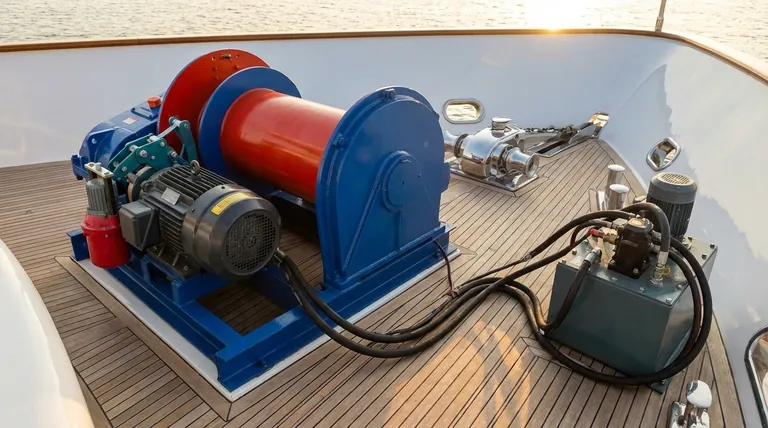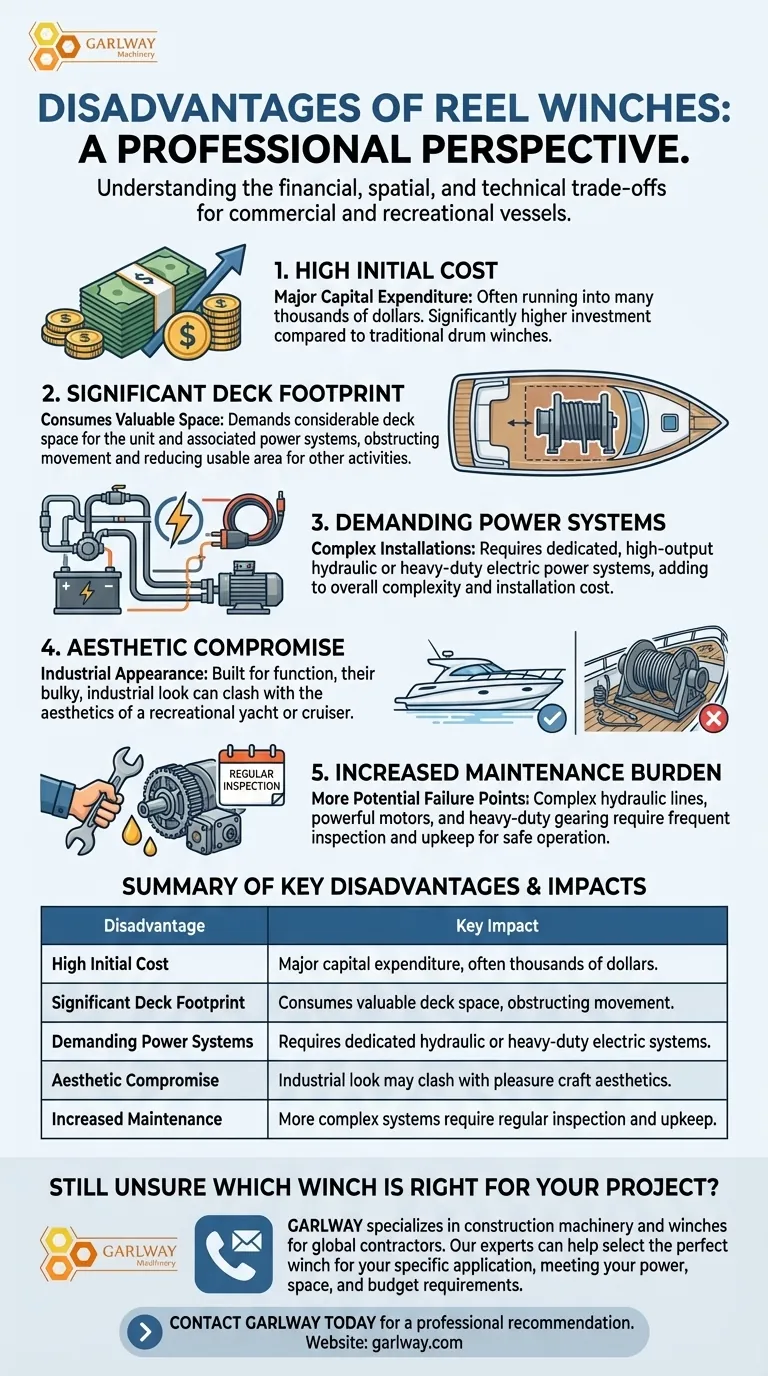At their core, the disadvantages of reel winches stem from their professional-grade nature, centering on high cost, significant space requirements, and complex power demands. These are not minor considerations; they are often the primary factors that make reel winches unsuitable for many pleasure boats.
While unmatched in power for specific applications, a reel winch's primary drawbacks are its substantial financial, spatial, and technical footprint, making it a highly specialized tool rather than a universal solution.

The Financial and Spatial Investment
Before considering performance, the practical costs in terms of money and deck space must be evaluated. These are often the first and most significant hurdles for potential owners.
High Initial Cost
Reel winches represent a major capital expenditure. Unlike more common drum winches, their robust construction and powerful drive systems place them in a premium price bracket, often running into many thousands of dollars.
Significant Deck Footprint
Space on any vessel is a premium commodity. A reel winch demands a considerable amount of it, not just for the unit itself but also for the associated power systems and clear operational area. This can obstruct movement and consume valuable deck space better used for other activities on a recreational boat.
Power and Complexity Demands
A reel winch's power does not come without consequence. The systems required to run them are more demanding and introduce a higher level of complexity to your vessel's operations.
Demanding Power Systems
These are not simple plug-and-play devices. Reel winches typically require a dedicated, high-output hydraulic or heavy-duty electric power system. Installing these systems is an involved process that adds significantly to the overall cost and complexity of the project.
The Aesthetic Compromise
For many owners of pleasure craft, a boat's appearance and clean lines are a point of pride. Reel winches are built for function over form. Their industrial, often bulky appearance can clash with the aesthetics of a recreational yacht or cruiser.
Understanding the Trade-offs
The decision to use a reel winch involves weighing its immense capability against its very real and practical downsides. For many, the trade-off simply doesn't make sense.
Overkill for Most Recreational Needs
The fundamental issue for many boaters is that a reel winch is often far more power than is necessary. For routine anchoring or line handling on a typical pleasure boat, the capability is excessive, making the high cost, space usage, and complexity a poor value proposition.
Increased Maintenance Burden
More complex systems inherently have more potential points of failure. Hydraulic lines, powerful electric motors, and heavy-duty gearing all require regular inspection and maintenance to ensure safe and reliable operation, adding to the long-term cost of ownership.
Is a Reel Winch Right for Your Vessel?
To make the right choice, you must honestly assess your vessel's primary purpose against the winch's demanding requirements.
- If your primary focus is commercial work, deep-water anchoring, or serious offshore cruising: The power and reliability may justify the high cost and complexity, provided you have the space and budget for a professional installation.
- If your primary focus is recreational day boating or coastal cruising: A traditional drum winch or capstan is almost certainly a more practical, cost-effective, and space-efficient solution for your needs.
- If your primary focus is maintaining the clean aesthetic and simplicity of your boat: The industrial look and complex systems of a reel winch make it a fundamentally unsuitable choice.
Ultimately, choosing the right winch means matching the equipment's capability to your actual, everyday operational needs.
Summary Table:
| Disadvantage | Key Impact |
|---|---|
| High Initial Cost | Major capital expenditure, often thousands of dollars. |
| Significant Deck Footprint | Consumes valuable deck space, obstructing movement. |
| Demanding Power Systems | Requires dedicated hydraulic or heavy-duty electric systems. |
| Aesthetic Compromise | Industrial look may clash with pleasure craft aesthetics. |
| Increased Maintenance | More complex systems require regular inspection and upkeep. |
Still Unsure Which Winch is Right for Your Project?
Choosing the right equipment is critical for efficiency and safety. GARLWAY specializes in construction machinery, offering robust winches, concrete mixers, and concrete batching plants for construction companies and contractors globally. Our experts can help you select the perfect winch for your specific application, ensuring it meets your power, space, and budget requirements without unnecessary complexity.
Get a professional recommendation tailored to your needs. Contact GARLWAY today to discuss your project and discover how our reliable machinery can deliver superior performance and value.
Visual Guide

Related Products
- Electric and Hydraulic Winch for Heavy Duty Applications
- Best 18000 Pound Drum Anchor Trailer Winch
- Portable Small Trailer Winch
- Electric 120V Boat Winch by Badlands
- 12000 lb Heavy Duty Electric Boat Winch
People Also Ask
- Do electric winches have brakes? Essential Safety for Your Heavy-Duty Pulling
- How to maintain an electric winch? Ensure Peak Performance & Reliability for Your Projects
- How do I choose an electric winch? A guide to safe and effective pulling power.
- Can you use an electric winch manually? A Guide to Dual-Functionality Winches
- How does the electric winch work? Unlock the Power of Force Multiplication













